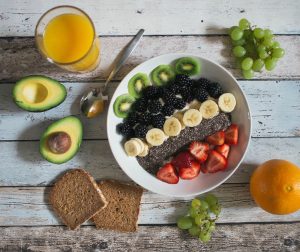By: Lara Baudains

Cycle Length and Ovulation
The length of a women’s menstrual cycle can vary enormously from person to person and from cycle to cycle, due to a variety of factors. There is some evidence to suggest that cycle length may vary in those adhering to a plant-based diet. These variations can include longer cycles, shorter ones or completely absent periods, however studies demonstrating the correlation to vegan diets are limited. What’s more, it’s important to remember that long cycles and absent ovulation may also result from conditions such as PCOS, thyroid disorders and perimenopause, to name a few. Why can plant-based diets affect your menstrual cycle? Well, there could be many reasons for this but the main one is that the average plant-based diet is lower in calories than an omnivorous one. A sustained calorie deficit can be read by the body as starvation, so your body tries to conserve energy wherever possible. This may mean switching off ovulation to avoid any chances of getting pregnant, resulting in irregular cycles. Reproduction is not seen as essential by the human body, and if your body feels under threat in any way, it will move into fight or flight mode where your sex hormones will be forced to take a back seat. By avoiding excessive exercise and including calorie-dense foods such as nuts, seeds, avocados and olive oil if you’re eating a vegan diet, you can help to avoid any energy imbalances and prevent your cycles from changing too drastically. Every woman’s body and cycle is unique so if you are wanting to experiment with your diet at the same time as trying to get pregnant, working with a professional nutritionist is advised.
Managing PMS symptoms through balanced hormone.
Mood swings, headaches, cramps, feelings of anxiety, greasy skin and breast tenderness are just a few signs of premenstrual syndrome (PMS). Some people suffer from all of these symptoms, others just a few and for some women, they experience none at all. When your hormones are working optimally, PMS should be mostly non-existent. Progesterone, the dominant hormone following ovulation, is the calming, mood stabilising, sleep-promoting hormone that helps to ensure healthy bones, shiny hair, supple skin and strong nails. If you’re not ovulating regularly you might be feeling a little out of balance or, if you are ovulating but dealing with excess estrogen or a short luteal phase, that’s when PMS can set in. Evidence is emerging of links between decreased PMS symptoms and predominantly plant-based diets although it’s early days. Why is this? Although the exact reason as to why PMS occurs is not fully understood, the decline in oestrogen and progesterone in the last few days of your cycle almost certainly plays a part. As the food that we eat can affect our hormone levels, it’s important that we pay close attention to our diet whether we include animal products in it or not.
Be aware of nutrient deficiencies

Why tracking your cycle is important when making dietary changes
By using OvuSense to reliably track your cycle, using live, core body temperature data analysis, you’ll be putting yourself in the best position possible when it comes to trying to conceive. OvuSense allows you to track any changes to diet and lifestyle by enabling you to access daily data on your body and menstrual cycle. This allows you and your nutritionist to see how changes are affecting your cycle but also introduce supplements where needed to maintain a regular, healthy cycle.

About Lara Baudains
Lara is a qualified nutritionist, personal trainer, health writer and product developer based in London. Registered with the Association for Nutrition (ANutr), she has carried out a Bachelor’s (BSc) degree in Biomedical Sciences and a Master’s (MSc) degree in Nutrition. She is also a level 3 qualified personal trainer and currently works as a freelance nutritionist as well as the Head of Nutrition and Product Development for a leading London based supplement company.If you’d like to find out more about her work, head to www.lara-nutrition.com or @lara_nutrition_ where you can work together to boost your fertility through diet.
